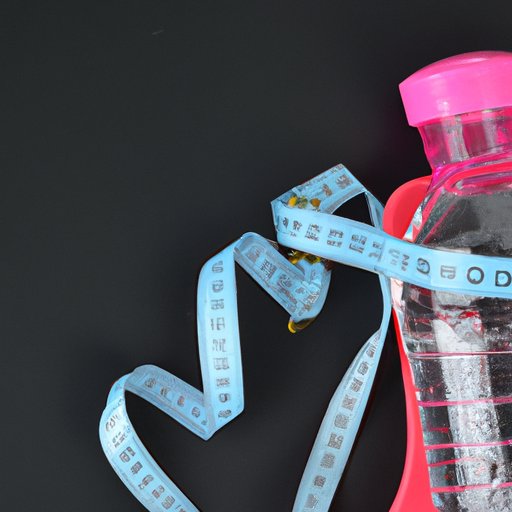
Introduction
Water weight, also known as water retention, is a common issue that many people face. It occurs when excess fluids build up in the body, causing bloating and swelling. Understanding the concept of water weight and its impact on the body is crucial for maintaining good health. In this article, we will discuss how much water weight the body can safely hold and provide practical tips for reducing water retention.
What is Water Weight and How Does it Impact Our Body?
Water weight is the excess buildup of fluids in the body. It can cause bloating and swelling, usually in the hands, feet, legs, and stomach. Water weight can be caused by various factors, including consuming too much salt, not drinking enough water, menstruation, and certain medical conditions.
When the body retains too much water weight, it can lead to excessive swelling, which can put pressure on the organs and cause health complications. For instance, excess fluid in the lungs can cause difficulty breathing, while water retention in the brain can lead to headaches and confusion.
How Much Water Weight Can the Human Body Safely Hold?
The human body can safely hold a certain amount of water weight depending on various factors. Age, gender, activity level, and overall health play a significant role in determining this amount.
On average, the body can retain up to 5-10 pounds of water weight without causing any harm. However, in extreme cases, the body can retain up to 20 pounds of water weight or more, which can be dangerous and requires immediate medical attention.
It is essential to maintain a healthy balance of fluids in the body to avoid excess water retention. Drinking enough water is a great way to keep the body hydrated and reduce the risk of water weight gain. Staying active and maintaining a healthy diet can also help prevent water weight gain.
Tips for Reducing Water Weight
Reducing water weight is possible by making simple lifestyle changes. Drinking enough water is the first step towards reducing water retention. You should aim to drink at least eight glasses of water every day.
Reducing your sodium intake is another practical tip for reducing water weight. A diet high in sodium can cause the body to retain more water than necessary. It is recommended to limit your sodium intake to 1,500-2,300 milligrams per day.
Adding more potassium-rich foods to your diet can also help reduce water retention. Foods such as bananas, avocados, and tomatoes are excellent sources of potassium that can aid in flushing out excess fluids from the body.
Regular exercise is another way to reduce water retention and lose excess weight. Exercising can increase blood circulation, which helps eliminate excess fluids from the body. Aim for at least 30 minutes of moderate-intensity exercise five times per week.
Medical Conditions and Medications that Cause Water Retention
Medical conditions such as heart disease, kidney disease, and liver disease can cause water retention. Certain medications, such as antidepressants, blood pressure medications, and steroids, can also cause water retention.
If you suspect that your water weight is caused by a medical condition or medication, it is crucial to speak with your doctor. Your doctor can recommend treatment options or alter your medication to reduce water retention.
Success Stories and the Benefits of Losing Water Weight
Many people have successfully lost water weight by making lifestyle changes. Losing water weight can lead to significant health benefits, such as reduced inflammation and improved mobility. It can also boost confidence and aid in weight loss efforts.
One success story is Mary. Mary was overweight and suffered from severe bloating and swelling due to water retention. She consulted with her doctor, who recommended drinking more water, reducing her sodium intake, and increasing her potassium intake. After several months of making these changes, Mary lost over 20 pounds of water weight and kept it off by maintaining a healthy lifestyle.
Water Weight vs. Fat Weight
Water weight and fat weight are different, and it is essential to understand the difference. Losing water weight is not the same as losing fat. The majority of people’s bodies possess some combination of both types of weight, making it important to focus on overall weight loss efforts. Only focusing on losing water weight can lead to temporary weight loss and result in frustration and disappointment with the lack of overall progress.
Creative Ways to Incorporate More Water into Your Daily Routine
Drinking water can often be boring, which is why it is essential to find creative ways to make it more enjoyable. Adding fruits and herbs to your water can make it more palatable. For instance, adding lemon, cucumber, and mint to your water can add a burst of flavor and boost your vitamin C intake.
Carrying a reusable water bottle and setting reminders throughout the day can help ensure you’re drinking enough water. You can also incorporate water-rich foods, such as watermelon, into your diet and make smoothies with coconut water as a base.
Conclusion
Water weight can cause bloating and swelling, but it can be managed through simple lifestyle changes such as drinking more water, reducing sodium intake, and exercising regularly. Additionally, medical conditions and medications can cause water retention, and it is essential to speak with your doctor if you suspect either might be causing your symptoms. Understanding the difference between water weight and fat weight is crucial to creating a sustainable weight loss plan. By drinking enough water, maintaining a healthy diet, and engaging in regular exercise, you can maintain a healthy balance of fluids in the body and reduce excess water retention.




